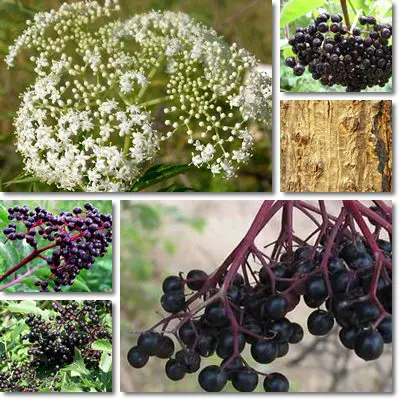Found throughout Europe, the black elderberry (Sambucus nigra) has started to gain popularity due to its rather impressive medicinal properties. This shrub-tree with purple-blue fruit and small, white flowers appears to be highly efficient against common influenza strains by speeding recovery.
Elderberry tea made from dried flowers is known to relieve nasal congestion (stuffy nose), alleviate cough, reduce fever and treat respiratory infections. Syrup, juice and tea made from elderberry is said to help calm stomach inflammation and improve gastritis symptoms, but its most notable health effects revolve around its immune-boosting benefits.
What do elderberries look like?
Elderberry is a shrub-like tree found in sunny meadows throughout Europe, North and Central America and even Asia. The shrub produces small, round, purple-blue, almost black shiny berries known as elder fruits or elderberries. Both the fruit and tiny, white flowers boast excellent therapeutic properties and have various medicinal uses, primarily related to the immune function and respiratory system infections.

What do elderberries taste like?
When ripe, fresh European black elderberries may range in taste from tart and tangy to bitter. However, the American elderberry (Sambucus canadensis) has slightly sweeter berries. Because fresh, ripe elderberries are not so palatable, many people prefer them cooked as jams, marmalade or made into juice.
Is it safe to eat elderberry fruit or flowers?
It is important to note that only the cooked, ripe, purple-bluish, almost black-colored elderberries and cooked or fermented elder flowers are edible and safe to eat. The bark, branches, leaves, raw, uncooked berries, seeds and raw berry juice of the elder species are not safe for consumption. They all contain glycosides which release a toxin called cyanide, the same found in inedible almond varieties or peach and apricot kernels.
Eating too many raw, unripe or underrripe elderberries, for example, or even eating raw, unripe or underripe elderberries in normal food amounts can cause nausea, vomiting, digestive upset and other more severe side effects. It’s always best to cook elderberries before eating them, even if they are fully ripe, to prevent any side effects. Elderberry flowers need to be cooked as well or otherwise processed too in order to render them safe to eat.
Just as important, always get your elderberry preparations from the pharmacy or authorized health food stores that can guarantee the contents of the preparation.

What are the benefits of Elderberry?
See below what are the most impressive properties and health effects of elderberry:
Antioxidant and chronic disease protection
Sambucus nigra is the only elderberry variety deemed suited for human consumption. The dark purple-blue color of ripe elderberries indicates the presence of flavonoids such as anthocyanins and quercitin. These natural chemicals are more than fruit pigments; they are powerful antioxidants which help remove free radicals from the body and protect against mutations in cells leading to cancerous formations. Consumption of elderberries and other flavonoid-rich berries such as blueberries, blackberries, red raspberries, yellow raspberries or mulberries is said to delay aging and prevent many forms of chronic disease such as diabetes, heart disease and cancer.
Effective against the flu
According to researchers, special compounds found in elderberry fruit block the activity of pathogenic microorganisms such as viruses and bacteria. This makes the only two non-toxic parts of the plant, elderberry flowers and elder berries ideal for the treatment of colds, flu and related respiratory tract infections. A 2004 study conducted on 60 subjects with various flu symptoms came to the following results: the subjects treated with black elderberry extract showed full recovery within four days after the onset of the symptoms. Those given a placebo showed delayed recovery. Similar studies confirmed the effectiveness of elderberry in flu treatment.
Remedy for nasal congestion, fever and cough
Elderberry preparations help relieve nasal congestion, lower fever and alleviate cough. Moreover, elderberries are efficient in treating the common cold as well as more troublesome respiratory problems such as bronchitis. Drinking black elderberry juice (even elderberry flower tea) helps clear a stuffy nose, reduce fever and alleviate cough due to the bioflavonoids and quercitin in the berries and flowers which block cold and flu pathogens (viruses) from infecting cells. Elderberry tea can increase perspiration, a quality which aids in fever reduction.
Rich in vitamin C
Elderberry juice concentrates far more vitamin C than a cup of berries and this contributes to strengthening one’s immunity. In fact, 100 g of elderberries provides almost 50% of the RDA of vitamin C. Some East-European health stores sell elderberry nasal decongestants and dry cough syrups for cold treatment. However, herbal infusions of the plant lack the nutrient altogether since the heat required to make them also destroys vitamin C.
See elderberry syrup benefits and learn how to make it yourself at home.
Elderberry for allergy and asthma
Elderberry is said to alleviate allergy and asthma symptoms naturally. It is believed to be particularly good for hay fever. However, when consuming elderberry for the first time, remember that there is a chance it may trigger an allergic reaction, in which case it is best to see a doctor before trying the fruit for the first time and find out whether or not you are allergic to it.
Benefits for high cholesterol and constipation
Elderberry reduces cholesterol levels, improves digestion and helps relieve constipation. Preliminary research suggests that elderberries promote cardiovascular health as well by playing a part in reducing LDL (bad) cholesterol levels. Dried elderberry flower infusions or juice extracted from ripe berries are believed to improve digestion and reduce the risk of developing respiratory and even yeast infections. Last but not least, elderberry is a mild natural laxative and diuretic.
Conclusion
Overall, the elderberry is a pretty impressive plant, with highly beneficial effects on human health. Tea made from elderberry flowers and juice from ripe elderberries are highly prized throughout Europe. Elderberry jam, marmalade, lemonade and socata or elderflower cordial are quite palatable byproducts. However, socata is a partially fermented elder flower drink with a rather high amount of refined sugar so it might be best to avoid it if you are having either acid reflux problems or if you are suffering from diabetes or pre-diabetes.
When dealing with elderberries, remember not to wear your favorite clothes because the juice of the berries stains. Also, elderberry looks quite similar to and grows in approximately the same areas with the highly toxic water hemlock (Cicuta), so it might be best to avoid touching and eating berries if you are unsure of what they are.

